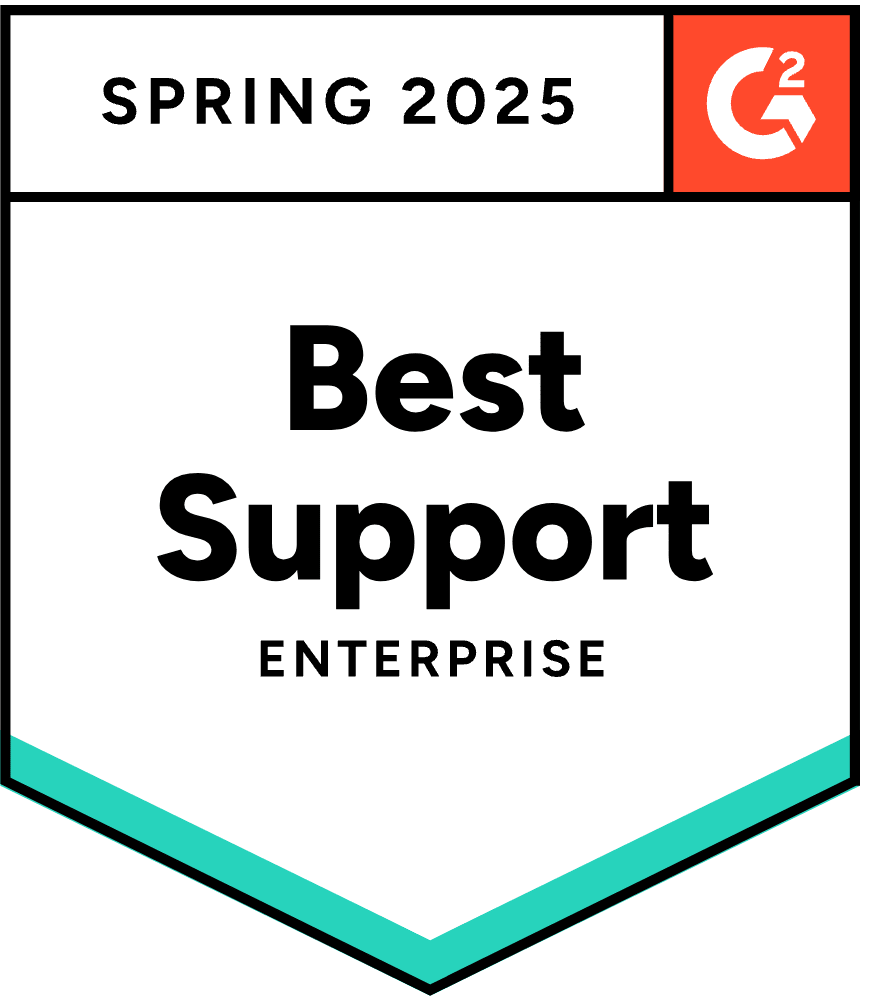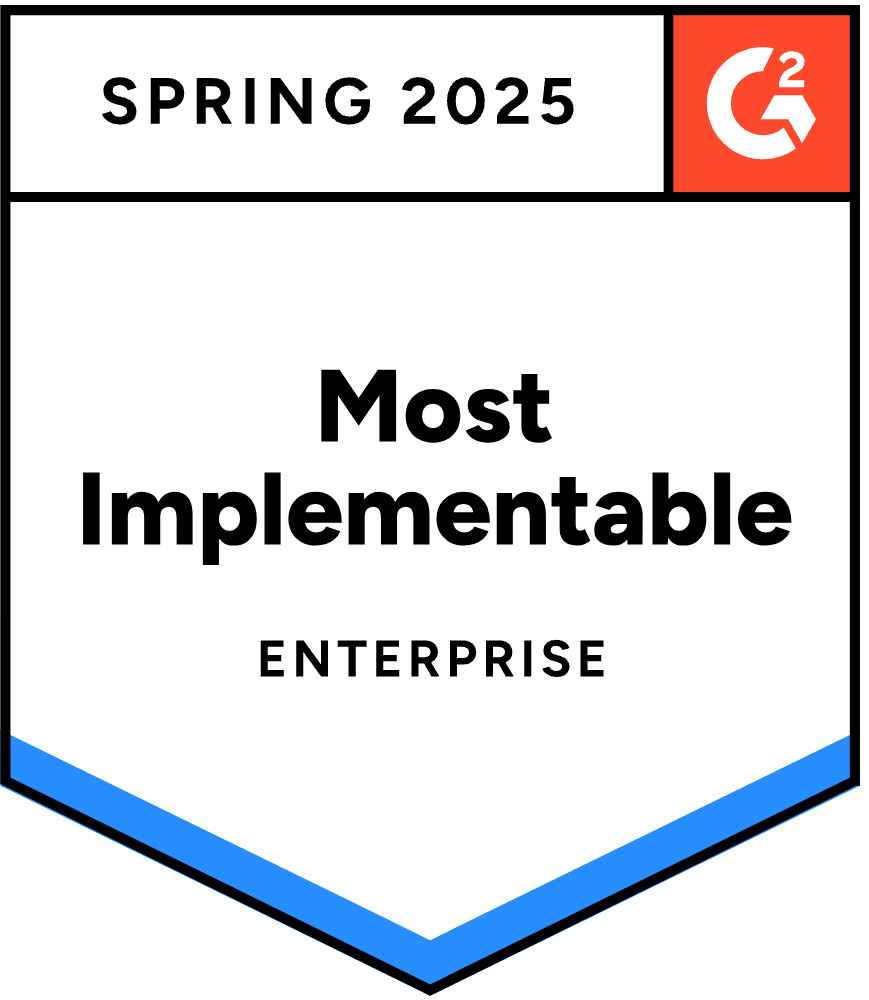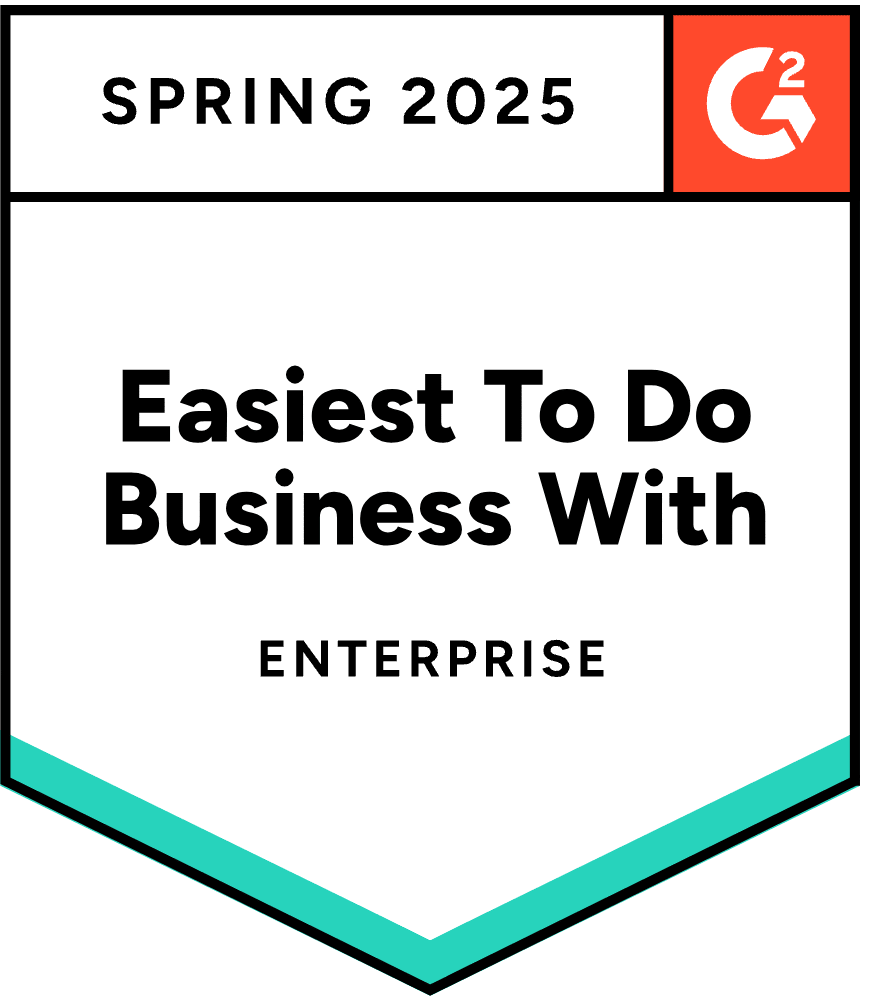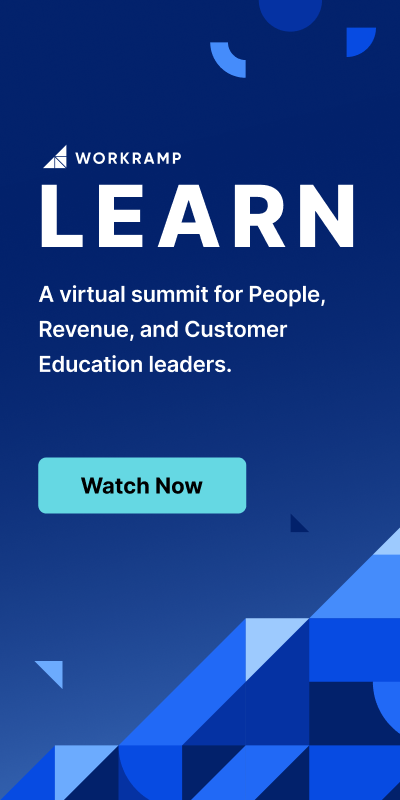21+ Best Customer Training LMS Software
Michael Keenan | WorkRamp Contributor
View bioLearning Tips Straight to Your Inbox
With the ever-changing business landscape and the real problem of customer churn, organizations recognize the critical role of effective customer training. Educating and empowering customers has become essential to achieving sustainable success.
In this post:
Learning management systems (LMSs) are necessary tools for organizations looking to train customers and partners. In fact, roughly 83 percent of professional organizations use an LMS today.
A customer training LMs provides a structured platform for delivering interactive and personalized training content directly to customers. A well-designed customer LMS can lead to improved product adoption, reduced support tickets, and a notable increase in customer retention.
Discover the key features of a customer LMS to amplify your training initiatives. Learn the basics of a customer training LMS and what features to look for when choosing the right one for your organization.
What is a customer training LMS?
A Learning Management System (LMS) is a powerful tool that lets you create, manage, and deliver educational content to customers and partners. An LMS can expedite training, track progress, and assess performance.
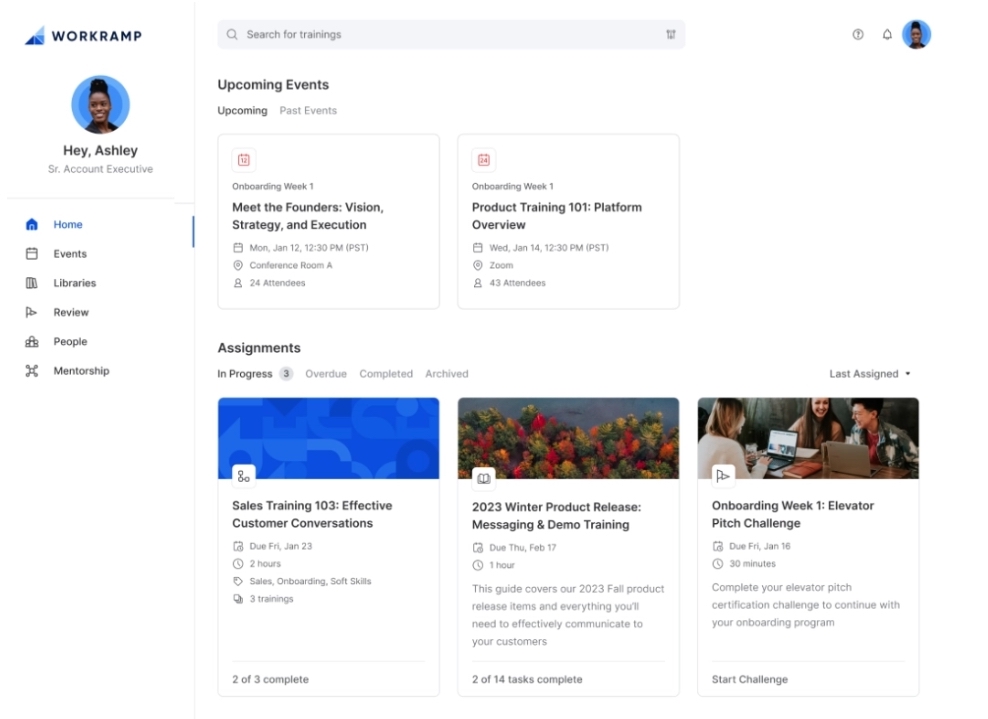
A customer training LMS is critical for educating customers on how to use your products and services. For example, say a customer wanted to learn how to use your tech suite effectively; you would train them through your LMS.
Using WorkRamp’s customer LMS, Quantum Metric launched Quantum Metric University (QMU), which trained over 1,800 customers and partners.
As a result of the LMS, Quantum Metric was able to:
- Create 50+ training modules
- Certify 75 percent of its customers
- Award 1,000+ certifications in the first year
How can an LMS help with customer training?
Practical customer training is a competitive advantage for brands in a crowded industry. But 50 percent of customers don’t use training offered by brands they bought from. And 25 percent of them are never offered the option.
With an LMS, you can easily integrate training and maximize value for your customers.
Here’s how you could implement a customer training LMS:
- Customer onboarding: When new customers sign up for your software, you can provide courses that guide them through the initial setup and primary use cases.
- Continuous learning: Your software will eventually evolve with new features and updates. To help customers adopt them, you can update the LMS with a new course that covers the updates in detail.
- Certification programs: Got customers that want to show off their proficiency with your software? Through your LMS, customers can complete relevant coursework and take a certification exam.
- Customizable learning paths: Not all customers use software the same way. Your LMS lets customers take courses most relevant to their needs.
- Tracking and analytics: You can use the LMS’s built-in analytics to monitor customer progress and activity. If a customer is struggling with a course or topic, you can proactively reach out and assist.
With an LMS, you can build a successful customer education program that creates positive relationships with buyers and helps you sell additional products and services.
When B2B pipeline generation platform Qualified used WorkRamp to build their customer education program, they found that trained accounts were 2x more likely to renew. Customers also used Qualified better, which improves satisfaction and retention.
Benefits of using a customer training LMS
Now that you know how to use a customer training LMS, let’s look at some benefits.
Centralize learning content
A customer training LMS is a central hub for your organization’s training and education content. It gives customers easy access to learning resources like videos, quizzes, simulations, and more.
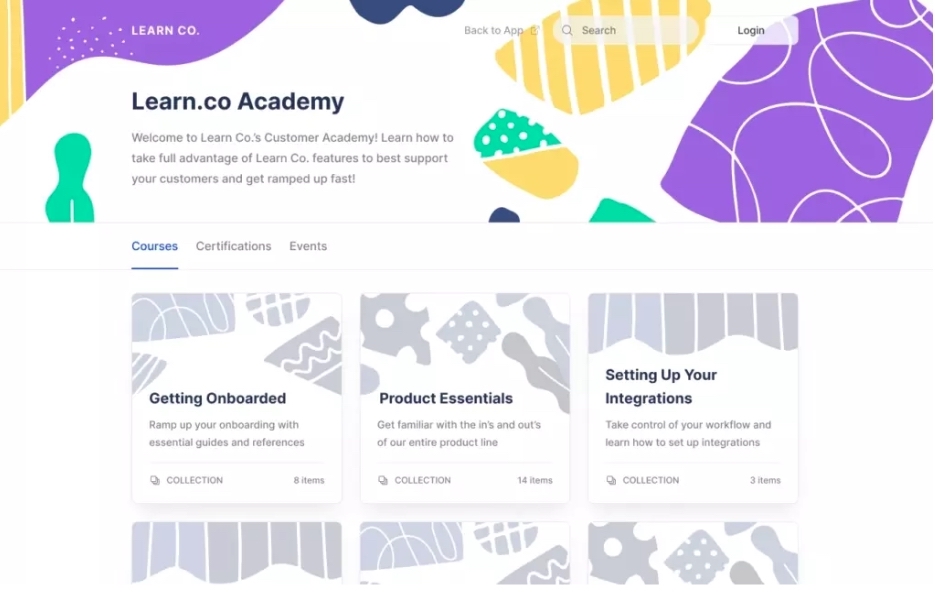
It also creates a consistent learning experience for customers. All learners use the same interface and follow the same processes to complete courses, which improves learning efficiency and customer experience.
“Prior to WorkRamp, our content lived in Google Drive. It could get disorganized, and there was no hierarchy. We were using Zendesk as a makeshift CMS, providing people with links to various articles and training collateral, which wasn’t a scalable approach. WorkRamp makes it [content management] really easy, which is why we were able to roll out trainings so quickly.”
— Sabena Carim Vibhakar, Director of Effectiveness and Enablement, MikMak
Reduce support costs
The average company spends around 11 percent of annual revenue on customer support. Well-trained customers are less likely to encounter issues with your product, requiring less support. A customer training LMS can guide users through the right materials to answer their questions quickly and easily.
Scale your training efforts
Your training efforts should grow with your organization. An LMS is flexible and efficient, and you can easily create and refresh training content.
Matillion was training customers live weekly before implementing an LMS. Face-to-face training was valuable, but the team could only train about 6 to 8 people at a time.
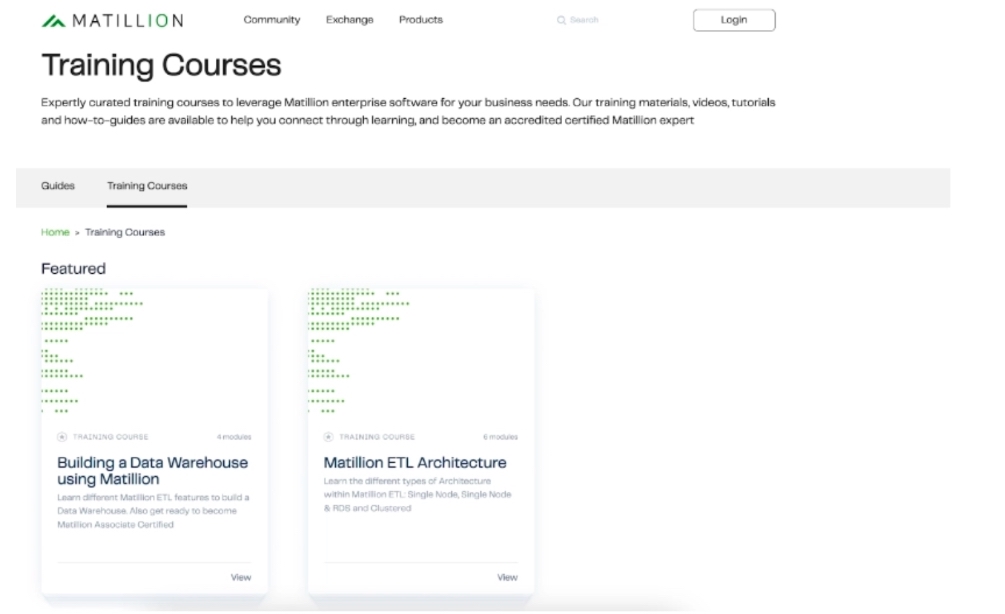
After building a customer education academy with WorkRamp, Matillion achieved:
- 9,232 enrollees in 2 years
- 5,534 course completions in 2 years
- 596 certified customers in one year.
Here are some ways an LMS facilitates customer training:
- You can automate administrative tasks like enrollment, reminders, tracking, and reporting
- It’s cloud-based so that users can access training content anywhere, anytime.
- You can easily add or update training content and roll out new training materials to a large number of people
- An LMS lets you track learner progress and assess the effectiveness of your program
Improve product adoption and usage
Customers gain a better understanding of your products and services through learning resources in a customer training LMS. Having a better understanding of products increases adoption and usage.
A TSIA study found that 68 percent of customers report using products more after training. The same study found that 56 percent use more product features than they would if untrained, and 87 percent of customers say they can work more independently when trained.
Increase customer satisfaction
Customers who receive proper training are more likely to have a good experience with your product. Plus, they are likely to stick around longer.
A recent Forrester study found that companies investing in customer training see an 11.6 percent increase in customer satisfaction.
Read more: How to Use Customer Education to Improve Customer Experience
Strengthen brand loyalty
A customer training LMS can help businesses build stronger customer relationships, increasing brand loyalty.
The same Forrester study found that companies with a customer education program see a 7.4 percent jump in customer retention.
Read more: Do These 6 Things to Increase Customer Loyalty
What to look for in a customer training LMS
When searching for a customer training LMS, consider the following factors:
- Ease of use: An intuitive, user-friendly LMS is critical for customer training. It reduces the learning curve and lets users focus on course content rather than navigating a difficult system. A good LMS will have a clean, well-organized interface, clear user instructions, and easily accessible support resources.
- Customization options: You want to incorporate your branding into any customer training LMS. This keeps your program professional and builds trust with customers. A good LMS will let you brand your learning portal and allow for different learning styles and needs.
- Scalability: Your LMS should accommodate a growing number of users, courses, and complexity. Ask vendors about user capacity limits for total and concurrent users. Be sure to understand how costs will evolve as you scale.
- Security and data privacy: Sensitive information is shared and stored in your LMS. Guarantee that your provider follows industry standards for data security. Some standards include encrypting data, providing access controls, and complying with relevant laws and regulations.
- Cost-effectiveness: How can a potential LMS generate a return on investment? The real ROI of customer education goes beyond the dollar sign. A good LMS will improve brand perception, help you create compelling content, and build community around your customer training program.
Read more: What is a Training Management System? Understanding the Key Features & Benefits
The LMS features you need for customer training
Content creation and management
Learning content creation and management are key features of an LMS. An effective customer training LMS will provide user-friendly authoring tools that allow you to easily create engaging and interactive training content.
You can upload existing materials (like PDFs or videos), create quizzes, and organize content into structured courses. For example, you can create a series of video tutorials and quizzes to teach customers how to use your new software.
With WorkRamp’s LMS Content Creation, you can leverage course authoring tools, templates, and prebuilt content to accomplish your learning goals. When you launch your LMS, you get access to a marketplace of editable templates so you don’t need to build training from scratch.
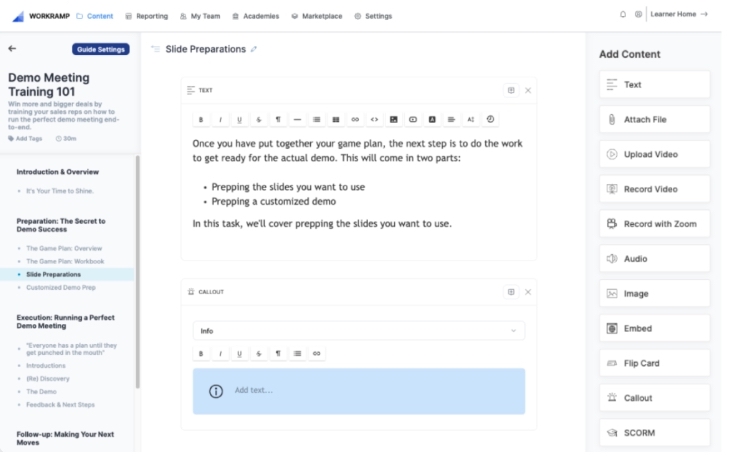
Learning path and course customization
A good customer training LMS will let you tailor learning experiences for different users and groups.
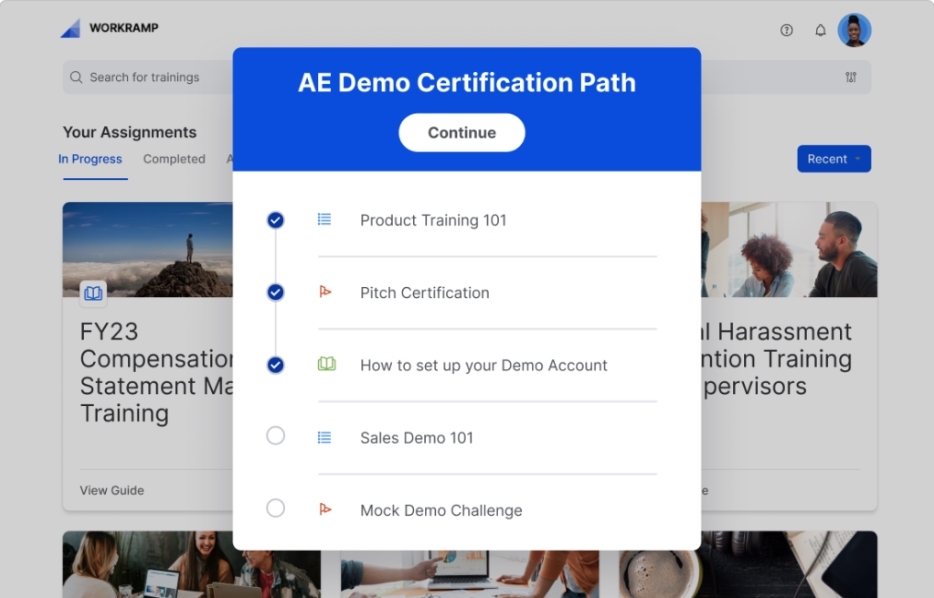
A new customer may require a comprehensive introduction to your product, while a returning customer may need training on new features. Your LMS should let you customize courses and learning paths to meet these needs.
Interactivity and engagement
Interactive features help to make training content more engaging and increase retention.
Look for an LMS with interactive training features like Flip Cards, challenges, roleplays, simulations, and more.
Reporting and analytics
An LMS should provide robust reporting and analytics so that you can track user progress, course completion rates, quiz scores, and more.
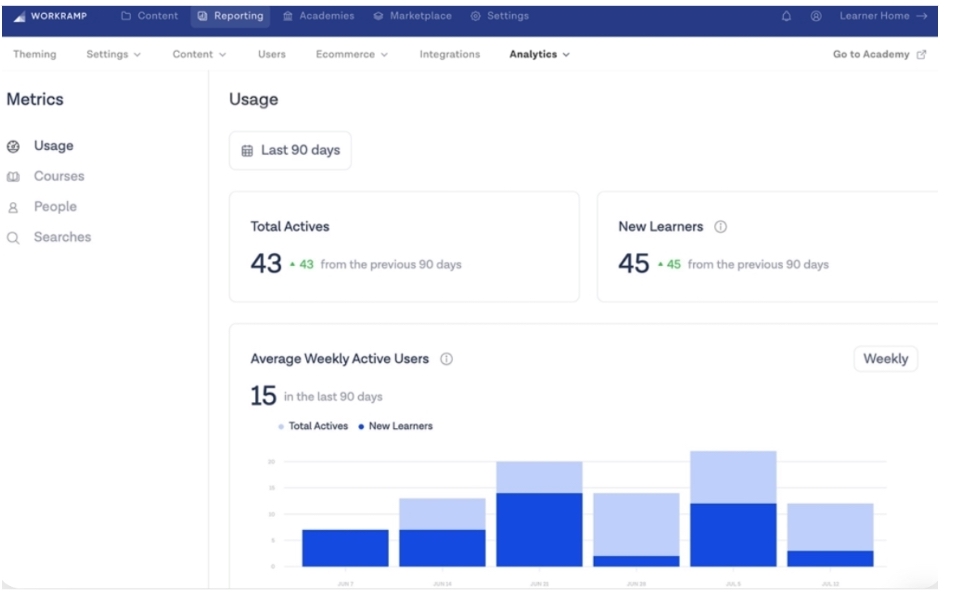
You can use this information to understand how your customers engage with your training content. Improving the related training material might be necessary if analytics show that many customers struggle with a particular quiz or module.
Cloud-based access
A cloud-based LMS allows customers to access training resources from any device with internet access.
Customers can learn at their own pace and in their own time, which can improve engagement and completion rates. For example, a customer might watch a training video on their laptop, then complete a quiz on their smartphone.
Mobile learning
The mobile learning market is expected to grow 30 percent annually from 2021 to 2026. If you want to launch a training program, you must optimize the content for smartphones and tablets.
Look for an LMS where customers can easily access courses, videos, and other resources on a mobile device.
Integrations
A good LMS should integrate with your existing tools and systems, such as your CRM system, customer support platform, or e-commerce platform. This can improve customer satisfaction and streamline your operations.
WorkRamp integrates with commonly used platforms like Gong, Zendesk, Salesforce, Slack, Zoom, Google Calendar, and more.
The Salesforce integration gives business leaders a full view of training programs’ efficacy and how they translate into business impact.
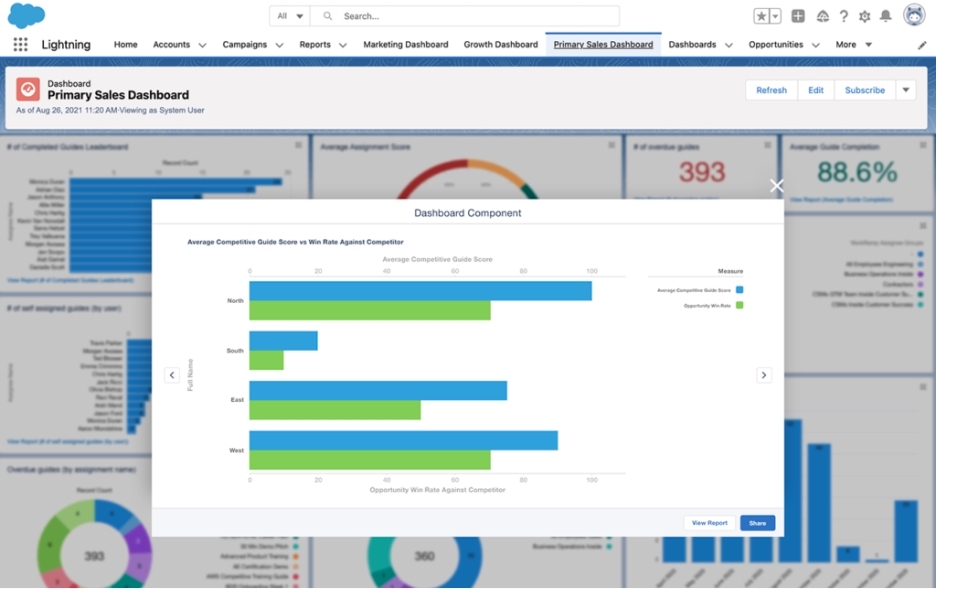
Best Customer Training Software & Customer Training LMS
When it comes to training and educating your partners and customers, you have numerous LMS options.
To help you make the best choice, we’ve prepared this guide covering 21 of the best customer training software for businesses in 2024. It includes a brief overview of each platform, along with some of its key features, biggest pros, and potential cons. We have a lot of platforms to compare, so let’s jump right in.
1. WorkRamp
WorkRamp Learning Cloud is an industry-leading LMS that combines the latest in generative and predictive AI with an impressive suite of features to deliver an easy-to-use, hyper-customizable, visually stunning customer training platform.
With WorkRamp Learning Cloud, your business can harness AI to generate localized, personalized customer training content in seconds. The platform allows you to track customer enrollment in training programs, create custom learning journeys, and support your customers 24/7 with virtual assistants and chatbots—all while centralizing your data in one secure, organized hub.
Regardless of where your customers are located, Learning Cloud gives them convenient 24/7 mobile access to the resources they need in 10 different languages. Whether you’re a small to midsize business, or a large enterprise with thousands of customers all over the world, WorkRamp offers a scalable, AI-powered solution to help you move the needle on your training programs farther and faster—at lower cost.
Key Features:
- AI-powered course authoring tools
- Blended learning features
- Communication and collaboration tools
- Customer community management tools (WorkRamp Communities)
- Customer and partner academy builder
- Customized learning paths
- Drag-and-drop content editor
- Gamification
- Instructor-led training
- Interactive features supported
- Intuitive, easy-to-use interface
- Learner progress metrics and course completion tracking
- Live and virtual event hosting
- Microlearning
- Robust reporting and analytics
- Seamless integrations with , and more
- Self-serve customer resources
- Social learning features
Pros:
- AI capabilities, including AI-powered content creation
- No-code, custom CSS, and Javascript options
- Cloud-based
- Mobile-friendly
- Secure and scalable
- 10 languages supported
Cons:
- Not suitable for businesses that want on-premise hosting
Reduce customer churn, create upselling opportunities, and boost product adoption with fun, interactive customer education programs powered by innovative AI. Discover how WorkRamp Learning Cloud can solve your customer training pain points.
2. Absorb LMS
Absorb LMS describes itself as “an AI-powered learning management system for all learners inside and outside an enterprise.” The platform has various use cases, including compliance training, upskilling and reskilling, new hire onboarding, employee development, customer training, and sales training.
Absorb LMS doesn’t currently provide pricing details on its website, but does reference “flexible pricing aligned to your needs and goals.”
Key Features:
- Reporting and analytics
- Content libraries
- SCORM
- Integrations
- AI-powered capabilities like Absorb Intelligence
- Social learning
- Gamification features like leaderboards
Pros:
- Mobile-friendly
- Numerous features and use cases
- 24/7 in-house customer support
Cons:
- Some users report difficulty uploading video files, viewing inactive courses, and navigating the admin interface
3. TalentLMS
TalentLMS is a cloud-based learning management platform that businesses can use to design and deliver online customer training content, along with partner training, extended enterprise training, remote workforce training, and various other use cases.
TalentLMS is rich with features that streamline your customer training efforts. For example, you can use the platform’s dynamic dashboards to visualize data, generate custom reports, and identify areas where improvement is needed. The platform allows you to brand and white-label your customer training portals, select training content from an extensive course catalog, and integrate seamlessly with the software you already use, such as Salesforce and Zendesk.
Key Features:
- API and Zapier
- Course creation tools
- Customizable certifications
- eCommerce tools
- Gamification
- Integrations
- TalentLibrary (course library)
- User-friendly interface
Pros:
- Cloud-based
- Mobile-friendly
- Supports multiple languages
- Has numerous use cases
- You can try various plans for free
Cons:
- Some reviewers complain about the cost-efficiency
- Doesn’t include consulting services
4. Skilljar
Skilljar describes itself as “the leading customer training platform for companies to accelerate product adoption and increase customer retention.” The platform is cloud-based and mobile-friendly, ensuring international customers can access training content from anywhere in the world.
Skilljar supports numerous types of content, including audio, video, and live streaming; offers an analytics suite to help you “measure business impact [and] track learner progress”; and integrates with a wide variety of software, including Salesforce, Intercom, Zendesk, Gainsight, Box, and Google Docs.
Key Features:
- Ability to create customized learning paths
- Native dashboard analytics and reporting
- SCORM compatibility
- Enterprise-grade security features
- Badges and certificates for course completion
- Learner assessments and quizzes
- eCommerce tools for selling subscriptions
- Interactive content
- Instructor-led training
Pros:
- Scalable and secure
- Implementation support
- Purpose-built for customer education
Cons:
- Some integrations are premium-only, including Paypal, Salesforce CRM, Zendesk, and Amplitude
- Some users say that the platform can be challenging to customize
5. Docebo
Docebo offers a large suite of products and services, including AI-powered learning management, AI-powered content creation, and Docebo Platform, which describes itself as “the first generative AI LMS.”
Docebo streamlines and facilitates customer education through a variety of features and tools. For example, you can use Docebo to automate workflows, create adaptive custom learning paths for customers, deliver content in a variety of formats, track metrics like support ticket volume, and connect all of your systems together into one centralized location. The platform also provides tools to “generate revenue by selling courses, certifications, and learning subscriptions.”
Your business can use Docebo not only to train and educate customers, but also for providing compliance training, sales enablement, partner enablement, talent development, and new employee onboarding.
Key Features:
- AI-boosted content generation
- AI-powered learning plans
- Automated workflows
- Content marketplace
- Gamification
- Learn Data for data analysis
- 500+ integrations
Pros:
- AI-powered
- 24-hour customer support
- Flexible pricing determined by total active users
- Numerous features and use cases
Cons:
- Comes with a mandatory onboarding/set-up fee
6. LearnWorlds
LearnWorlds describes itself as an “online course platform for creating, selling and promoting your online courses,” such as courses designed for your partners and customers. The platform allows businesses to create customer training programs that are “based on product type or complexity level, dividing learners into User Groups” that can all be tracked across one dashboard.
Key Features:
- AI-assisted course builder
- Advanced analytics
- Auto-generate branded certificates
- Learner exams and assessments
- Custom user roles
- Enterprise-grade security
- White-labeled online academy building tool
Pros:
- Affordable plans starting at just $24 per month
- Free trial
- 50+ website templates to choose from
Cons:
- Some reviewers have negative comments about the platform’s ease of use
7. Adobe Learning Manager
Adobe Learning Manager, formerly branded as Adobe Captivate Prime, is a cloud-based, AI-powered learning platform that enables businesses to “deliver personalized learning to customers and employees alike.” It provides detailed reporting and analytics, automates a variety of time-consuming manual tasks, and uses AI to make course creation fast and easy.
Key Features:
- AI-powered and admin-driven content recommendations
- Automated user onboarding
- Automated course assignment
- Content library containing 86,000+ courses
- Customer engagement tracking
- Gamification
- Guided learning paths
- Integrations
- Personalized learning journeys powered by AI and machine learning (ML)
- Reporting and analytics
- Sales and partner training
- Self-service portal
- Social learning features
Pros:
- Free 30-day trial
- Extensive prebuilt course library
Cons:
- Some reviewers complain about Adobe Learning Manager’s pricing plans and licensing fees
8. Academy of Mine
Academy of Mine describes its service as an “all-in-one platform for professional training.”
Cloud-based and scalable, Academy of Mine enables businesses to provide B2B online training using various approaches and formats, from webinars and instructor-led training to self-paced, asynchronous online courses that learners can complete on their own schedule. You can also use it to generate learner reports, allowing you to track course completion rates, learner performance on assessments, and other data.
In addition to customer training, the platform also has use cases for safety training, compliance training, partner training, and talent development.
Key Features:
- Branded customer portals
- Course creation tools
- Course enrollment tracking
- Integrations and API
- Learner progress and engagement tracking tools
- Single Sign-On (SSO)
- Self-paced courses
- Supports video, PDF, HTML, and more
- Tools for providing and collecting learner feedback
- Virtual instructor-led training
Pros:
- Scalable
- Supports mobile learning
- Has various use cases beyond customer training
- Offers industry-specific solutions, including solutions tailored to the real estate, healthcare, IT, and legal industries
Cons:
- Starting at $999 per month, Academy of Mine’s most affordable plan (“Professional”) is likely outside some organizations’ budgets
9. 360Learning
360Learning offers various products, including a learning management system that can be used to develop and deliver customer training content. With 360Learning’s customer training LMS, your business can create personalized training materials in just a few minutes using the platform’s course templates. Plus, 360Learning features an AI tool to help you quickly create quizzes and provide content suggestions.
Key Features:
- AI-powered content recommendations
- AI-powered course building tools
- Automated course enrollments
- Content libraries
- Course creation templates
- Certification expiration alerts
- Custom integrations
- Customized and automated reports
- Feature-rich content editing tools
- Learner segmentation
- User management tools
- SCORM management tools
- SSO
Pros:
- Ability to personalize content
- Includes a dedicated tech support team (Business plans only)
- Mobile learning app
Cons:
- Some reviewers say that the platform’s blended learning features could be improved
10. Brainier LMS
Brainier LMS is an online learning management system designed to help businesses provide “personalized learning experiences for each organization, group, team, and individual—at scale.”
Choose content from Brainier’s curated course library, or build your own courses in minutes using generative AI—Brainier lets you train your customers through webinars, real-time video chat, personalized self-paced courses, and other types of eLearning content.
Key Features:
- Embedded AI features, including AI Coach, Auto Analysis, and Daily Snapshot
- AI-powered content recommendations
- AI-powered course creation tools
- Bulk user and group import features
- Data visualization tools
- Push notifications
- Single Sign-On
- SOC 2 Type II compliant
- Unlimited storage
- Virtual meetings and screenshare capabilities
Pros:
- Mobile app
- Compatible with Android and iOS
- Responsive design
- Cloud-based
- Provides the ability to create a sandbox site
Cons:
- Some users say they would prefer more customization options and note that building custom reports could be easier
11. Litmos LMS
Litmos LMS is a multipurpose LMS with use cases for customer training, employee training, new employee onboarding, and more.
When it comes to educating customers, the platform allows you to track and analyze learner data, collect customer feedback, and share training content in various formats, “including videos, audio files, PowerPoints, reference documents, and SCORM files.” The platform also has built-in eCommerce features, making it easy to monetize the courses you offer.
With Litmos LMS, you can train more than just your customers or employees—you can also use the platform to manage contractor training, supplier training, operations training, and even gig worker training.
Key Features:
- Automated enrollments, learning paths, and other tasks
- Built-in content authoring tools
- Custom dashboards and branding
- Custom learning paths
- Gamification and leaderboards
- Instructor-led training
Pros:
- Cloud-based
- Mobile-friendly
- Industry-specific solutions for retail, hospitality, nonprofits, and more
- Supports 37 languages
- Offers 14-day free trial
Cons:
- Some important features are only included in Litmos’ top-tier pricing plan (“Platinum”), including gamification, AI video assessments, custom domains, and custom user roles and permissions
12. Thought Industries
Thought Industries is an online platform for building and delivering eLearning content to your customers, partners, and resellers.
Your business can use Thought Industries’ platform to create personalized, customer-specific onboarding content; build a thriving online customer community around your brand; and offer opportunities for blended learning, a proven-effective approach to training that combines self-paced (asynchronous) learning with live (synchronous) instruction.
Thought Industries is cloud-based, ensuring learners can access the platform from almost any device or location.
Key Features:
- Adaptive learning paths
- API and integrations
- Blended learning
- Branding and white-labeling
- Drag-and-drop content builders
- Gamification
- In-app dashboard
- Instructor-led training
- Interactive content
- Learner certifications
- Learner tests, quizzes, and assessments
- Microlearning
- Peer collaboration and community features
- Synchronous (live) and asynchronous learning
Pros:
- Industry-tailored solutions for manufacturing, software/technology, and other industries
- Options for training resellers
- Responsive design
- Cloud-based
Cons:
- No free trial option
- Some reviewers say that customizing reports is challenging
13. LearnUpon
LearnUpon is an AI-boosted learning management system that has various features to help you create educational content for your customers, as well as your partners and employees. For example, LearnUpon’s AI-powered course creation tool lets you build “a range of interactive content options, including webinar and instructor-led training, SCORM and xAPI files, documents, and video”—all in just a few seconds or minutes, instead of weeks or months.
With LearnUpon’s flexible platform, businesses can invite customers to enroll in self-paced courses—or, for essential training like safety training, automate mandatory course enrollments.
As of April 2024, the platform is planning to release an “interactive smart coach” to help give learners personalized feedback and suggestions.
Key Features:
- AI-powered course creation features
- Automated course enrollments and self-serve learning
- Automated workflows
- Bulk uploads enabled
- Course catalog
- Course completion certificates
- Learner exams and assessments
- Learner progress dashboards
- Out-of-the-box reports
- User segmentation and management tools
Pros:
- Automation and AI capabilities
- Interactive smart coach feature coming soon
Cons:
- White-labeling and Salesforce integrations are only included in the top-tier pricing plan (“Enterprise”)
14. Tovuti LMS
Tovuti LMS calls itself “an easy-to-use, all-in-one LMS software” that provides a “fast and simple way to create courses, engage learners and train teams” for small, midsize, and large organizations.
When it comes to training your partners and customers, Tovuti LMS offers powerful tools like AI-assisted content generation, which allows you to “create quizzes and lessons in seconds.” The platform supports microlearning, lets you build custom learning paths, and allows you to create a content repository that acts as an easy-to-access knowledge base for learners.
Key Features:
- AI-powered content creation tools
- Analytics tools
- Automated reminders and alerts
- Blended learning
- Custom branding and white-labeling
- Gamification features like memory games and leaderboards
- Native integrations, custom integrations, and open API
- Net Promoter Score (NPS)
- Over 2,000 integrations
- User groups and permissions
Pros:
- Mobile app and responsive design
- Industry-specific solutions for finance, HR, higher education, and more
- Scalable with unlimited users
- 12+ languages supported
Cons:
- Starts at $775 per month, which does not include the one-time $2,500 set-up fee
15. Thinkific Plus
Thinkific is a course-building platform that allows users to build customer communities and create and sell online learning content. Thinkific Plus is an upgraded version of Thinkific equipped with “enterprise-grade features” to help you “create customer training that accelerates onboarding [and] reduces churn.”
With Thinkific Plus, you can onboard and educate customers about your product or service’s features and use cases. You can also use Thinkific Plus to sell B2B training content to other organizations. Either way, you’ll receive “access to world-class support and a personalized 1:1 launch experience” to help you get up and running.
Key Features:
- Branded and white-labeled mobile app
- Communities analytics dashboard
- Drag-and-drop course building tools
- Learner assessments and quizzes
- Pre-made course templates
- Push and in-app notifications
- SSO
- Tools for building and managing learner communities
Pros:
- Free trial with limited features
- Supports mobile learning
Cons:
- Some reviewers say that there could be better features for upselling and that the interface needs improvement
16. MarbleFlows
MarbleFlows offers a product called MarbleAcademy, which allows you to “build stylish courses embedded in your app or website and packaged in your white labeled themed academies.”
You can use MarbleAcademy to create courses in as little as just 10 minutes, making it speedy and effortless to start building training programs for your customers. In addition to customer training, the platform also has use cases for partner education.
Key Features:
- Easy-to-use course building tool
- In-depth analytics
- Learner quizzes and assessments
- Microlearning
Pros:
- Offers white-labeling
- Fast to get started using
- Numerous design templates available
Cons:
- Pricing starts at €399 (about $432) per month, which might be outside of some companies’ budget range
17. Continu
This cloud-based learning management platform lets you “create engaging learning content like a pro using Continu’s powerful authoring tools.” With Continu, your business can create custom learning tracks, provide virtual workshops and training, build learner assessments and quizzes, and automate various workflows.
In addition to customer training, Continu also provides tools for employee training, partner training, sales training, and other use cases.
Key Features:
- Automated workflows
- Ability to create custom learning tracks for partners and customers
- Communication and collaboration tools
- Content authoring and course building tools
- Custom reminders and notifications
- Custom reporting and exportable reports
- In-platform video coaching
- Instructor-led training
- Learner badges
- Learning journeys
- Open APIs
- Personalized content recommendations
- Real-time learner progress tracking
- Smart Segmentation
- SSO
Pros:
- Responsive design
- Supports mobile learning and multiple languages
- Suitable for small (under 250 learners), midsize (250-5,000 learners), and large (over 5,000 learners) organizations
Cons:
- Advanced integrations, API access, and post-implementation support are only included in the top-tier pricing plan (“Enterprise”)
18. Cornerstone Learning
Cornerstone calls itself an “end-to-end learning content solution” that enables your small, midsize, or large business to “deliver, manage, and track global training for your workforce, customers, and partners.”
In addition to educating your customers and partners, your business can also use Cornerstone for training distributors, franchises, and other learners who are outside of your organization.
Deliver leadership and management courses, compliance and ethics courses, professional skill-building courses, and more. Choose curated courses from Cornerstone’s content hub, or build your own courses from scratch using the Cornerstone Create Tool.
Key Features:
- Analytics and reporting
- Integrations and APIs
- Engagement surveys
- Curated content hub
- Version management
- Automated workflows
- Integrations
Pros:
- Mobile app available (Cornerstone CSX)
Cons:
- Some users report that the platform can be challenging for new administrators to navigate and that it requires extensive training for new users
19. Moodle
Moodle offers several products. They include Moodle LMS, which is a cloud-based LMS geared toward teachers and schools, and—likely more relevant to your business—Moodle Workspace, which is designed to help businesses create and manage online training.
Moodle Workspace describes itself as “a flexible enterprise learning management platform that combines the best features of Moodle LMS with advanced tools for workplace learning.” Your business can use Moodle Workspace to automate manual tasks, create department-specific training content, and more.
Key Features:
- Automated workflows
- Custom reports measuring learner progress and engagement
- Certified LMS integrations
- Custom domains
- Course completion certificates
- Course building tools
Pros:
- Scalable
- Robust security
- Easy data migration
- Knowledge base and support portal access
Cons:
- Some users report that the platform can be somewhat technically challenging to set up and start using
20. iSpring Learn
iSpring Learn describes itself as an LMS for employee training “to onboard, upskill, and certify your teams.”
In addition to employee training, the platform also allows businesses to “easily create and deliver product knowledge training” to their partners and customers. iSpring Learn also has use cases for channel partner training, compliance training, and new hire onboarding.
Key Features:
- SCORM support
- Unlimited storage space
- iSpring Suite course editor integrated with PowerPoint
- User and content management tools
- Reporting tools, including people reports and content reports
- 360-degree feedback
- Branding and white-labeling
- Gamification
- Mobile app
Pros:
- Cloud-based with optional on-premise installation
- Mobile-friendly
- Free trial available
Cons:
- The cost might be a barrier for some organizations, with pricing starting at $650 annually for businesses and $470 annually for academic institutions
21. Firmwater LMS
According to the platform’s website, “Firmwater offers eLearning hosting services to businesses that provide online training to multiple audiences,” enabling you to train customers, partners, employees, and other audiences.
Your business can use Firmwater LMS to build eLearning courses and content, track how learners are progressing, and generate interactive reports, including reports on course completions, attempts, usage, and participant status. Plus, since Firmwater is partnered with Shopify, content creators can use the platform to easily sell content and create virtual storefronts.
Key Features:
- Data and analytics
- SCORM compliance
- Integrations
- Intuitive interface
- Automated email notifications
- Course completion certificates
Pros:
- Cloud-based
- Various pricing tiers
- Offers eCommerce features in addition to customer training tools
Cons:
- Geared specifically toward training companies, which excludes many types of organizations
How to choose the right LMS for customer training
Thinking about getting an LMS for your customer training program? Here’s how to choose the right one:
- Define your training goals and objectives: Establish clear goals for your customer training program. Some common goals include improving product adoption, reducing support requests, or increasing customer satisfaction.
- Identify your customer training needs: Consider the specific requirements of your customer base, such as the type of content they need, their preferred learning styles, and any accessibility requirements.
- Evaluate LMS features: Ensure your potential LMS offers the essential features for customer training. As mentioned, these include reporting capabilities, cloud-based access, integrations, and all-in-one functionality.
- Test different LMS platforms: Request demos or trials from various LMS providers to get hands-on experience with their platforms.
- Compare pricing and value: Consider the costs associated with each LMS, and the value it can deliver in terms of customer satisfaction, retention, and long-term revenue growth.
- Seek customer testimonials and case studies: Research other organizations that have successfully implemented a customer training LMS and learn from their experiences.
👉 See why top companies, from startups to Fortune 500s, choose WorkRamp to educate their customers. Check out our Customer Stories.
How to use WorkRamp for customer training
Customer training is an investment that’ll pay big in the long run. That’s why you want to invest in an LMS explicitly designed for it.
Here’s how you can leverage WorkRamp’s features for an effective customer training program:
- Interactive content: Create engaging, interactive training materials using built-in content creation tools. This will help ensure customers are actively participating in the learning process.
- Learning paths: Design customized learning paths for customers based on their unique needs and skill levels, ensuring they receive relevant, targeted training.
- Assessments and certifications: Assess customer knowledge and progress using WorkRamp’s assessment tools. Offer certifications upon successful completion of courses to incentivize customers and recognize their achievements.
- Reporting and analytics: Use WorkRamp’s comprehensive reporting and analytics tools to gain insights into customer progress, identify areas for improvement, and measure the success of your training program.
- Integration with existing tools: Seamlessly integrate WorkRamp with your existing software and tools, such as CRM systems and communication platforms, to streamline your training process and ensure a cohesive customer experience.
Ready to see how WorkRamp’s Customer Learning Cloud can help you increase product adoption and develop loyal brand advocates? Contact us for a free, personalized demo.
Complete the form for a custom demo.
Recent Posts
- Top LMS Integrations That Power Smarter, Faster Learning July 2, 2025
- Introducing WorkRamp Analytics Studio: Unlocking Your Data Insights with AI June 30, 2025
- 11 AI LMS for AI-Powered Learning June 27, 2025
- The Best LMS Platforms for Customer Retention (2025 Guide) June 27, 2025
- 11 Best AI Learning Platforms June 16, 2025
Michael Keenan
WorkRamp ContributorMichael is a SaaS marketer living in Guadalajara, Mexico. Through storytelling and data-driven content, his focus is providing valuable insight and advice on issues that prospects and customers care most about. He’s inspired by learning people’s stories, climbing mountains, and traveling with his partner and Xoloitzcuintles.
You might also like
Learn how a customer education program can help you boost engagement and retention
An effective customer ed program can help users and have a significant impact on long-term business goals.
Read More
Increasing product adoption and improving customer engagement
Discover how five WorkRamp customers use Academies to engage customers for better business outcomes.
Read More
What is customer churn, and how can you prevent it?
Reducing customer churn can help you lower costs, increase profitability, and turn users into advocates.
Read More
Decrease Ramp Time and Increase Revenue
Get in touch to learn how WorkRamp can help you achieve your learning and development goals.
Request a Demo